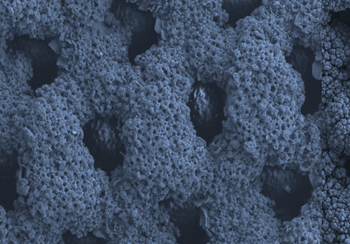Symposium Additive Manufacturing of Energy Materials
On 18 October 2023 the first symposium Additive Manufacturing of Energy Materials will take place at the U Parkhotel (University of Twente) in Enschede. This symposium is a joint 4TU.HTM & M2i initiative in collaboration with the University of Groningen.
To meet the increasing energy requirements in a low-carbon economy, the development of new materials that improve the efficiency of sustainable large scale energy conversion and storage systems is essential. Additive manufacturing (AM) technology with the capability of fabricating complex physical products of a variety of materials and composites from digital models is a great candidate for obtaining “pre-programmed” site-specific properties, as for example, well-defined three dimensional (3D) porous structures and novel materials for energy applications.
University of Twente will host the in-person one-day symposium expecting participants from multidisciplinary research (materials science, chemical engineering, physics, and mathematics), AM, and energy application communities.
More information on the programme: Additive Manufacturing of Energy Materials
Scope
This networking event aims to facilitate collaboration and partnership opportunities among professionals, researchers, entrepreneurs, and industry leaders to explore cutting-edge technologies and solutions for a sustainable future. The symposium will cover a diverse range of topics including electrodes for CO2 electrochemical reduction, fuel cells, AM of porous/composite materials for energy systems, advanced catalyst synthesis routes, and modeling of additive manufacturing processes. This will eventually lead to highlighting the recent advances in this field and future directions for research and development of functionalized high-performance, cost-effective materials with a low carbon footprint, for a wide range of energy systems. Following this symposium, we will organize a consortium workshop with potential partners and stakeholders to discuss the objectives, scope, and potential collaboration opportunities for a large program. By following this “networking” and “consortium building”, we aim to establish a strong network of collaborators and form a consortium that is well-equipped to tackle the energy crisis.
The presentations and discussion will cover application-oriented topics over the whole field of Energy Materials, including:
- Additive manufacturing
- AI-guided design
- Functionally graded materials
- Composite materials
- Multi-materials
- Electrode materials
- Energy conversion
- Energy storage




 Location: Campus University of Twente
Location: Campus University of Twente